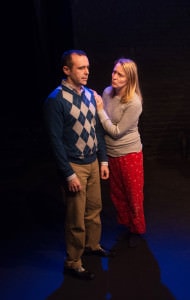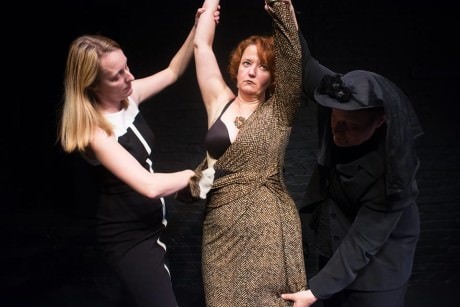Elaine May’s George is Dead is a brutally funny, wincingly and wickedly unsympathetic depiction of life among the social classes in our Late Capitalist era, and could equally well have been titled Selfies. It’s an unflinching look at how selfish we can all truly be if we define ourselves only by money and possessions rather than human liberation and self-realization.
Watching it in the audience can be stone-cold sobering, yet also eased by the punctuation of comic relief. It is like taking a bath and steeling yourself for someone to drop an electric appliance into the water., and yet also grasping the dark humor of the situation. The jokes are just that funny but deadly.

That it’s so short (just one act, no intermission) and so merciless about astringent life in a state of nature without altruism, one defined by the strictures of hierarchy and and the heedlessness of privilege, summons to mind the chilly depiction, by the 17th century English moral philosopher Thomas Hobbes, of the world at its worst, of violence and predation, as a life that’s “brutish nasty — and short.”
To fully appreciate this twisted slant on life – where death is almost a mercy – it helps to recall the old Cold War maxim that in a nuclear war the living would come to envy the dead. But with Elaine May’s George Is Dead, the audience at the DC Arts Center — where it runs through December 19th — at least has the consolation prize that it’s possible to appreciate that the character in the play who is actually best off, is one we never meet (alive, at least), the same eponymous character — George himself.
The first line of the play is “George is dead!” Compared to the other characters, however, George has all the luck. At least maybe George (considering what his marriage must have been like) died laughing. And laughter is the only tonic for the audience as this comedy of (bad) manners unfolds.
This black comedy is a specialty of the playwright, the legendary Elaine May. First known to an earlier generation for her improv comic turns and acid themes during the era of Sputnik and the Bay of Pigs, she emerged as one half of the team of “Nichols and May.” Whether it was creative differences or something deeper, the team only lasted four years (1957-1961) together before taking different directions. Mike Nichols, who just died last year, later would come into his own as a highly successful film director, the toast of “tout New York” and the husband of Diane Sawyer.
So yes, George Is Dead opens with those words, while “It’s Beginning to Look a Lot like Christmas” plays on the radio, and the door opens with a bang — as a 50-ish zillion-heiress Doreen comes through the door and into the apartment and indeed into the shabby-genteel life of Carla, who is vaguely dissatisfied that her marriage to high school history teacher Michael is clearly on the rocks. Carla is the daughter of Doreen’s (former) faithful but now 90-year-old Nanny. So the two women are worlds’ apart in social status. Carla is a little shabby, dressed in sweatpants. Doreen is, well, Doreen, with clothes to match her pocket book.
In the wake of this encounter among the three women, it’s clear that like hamsters on a wheel they cannot escape the ancient hierarchies. They have the past in common, and as historians know best, the past is never really simply the past — it infuses the present. As has been said, “history does not repeat itself exactly, but it rhymes.”
As for George Is Dead, it is latter-day May, first performed on Broadway from 2011 – 2012, starring Marlo Thomas as Doreen and directed by the actor-director John Turturro.
The play is the first production of the new DC company, The Klunch, spearheaded from Brooklyn by Ian Allen, founder of the much-missed punk theater troupe, Cherry Red Productions that was so very lively in DC in earlier years until closing in 2011, when Allen decamped for Brooklyn. The Klunch company actually is comprised of many Cherry Red veterans and Allen is its artistic director.
The cast is uniformly superb, so good in fact that I felt I wasn’t watching acting, I was watching living.

Interviewed by Joel Markowitz on this website, the cast described how Allen sent them all an essay titled “How To Speak Poetry” by the lapidary songwriter Leonard Cohen. John Tweel, who makes a big deal effectively out of his smaller part as Carla’s fulminating husband Michael, told DCMTA that “the main thrust (of the essay) is that there’s no need for ‘Acting’ with a capital ‘A.’”
This homage to Allen is echoed by Kerri Rambow, a member of The Klunch company, who plays Carla with long-suffering, slow-burn stoicism, turning Carla into the “straight-man” to play against Doreen’s off-the-wall and yet utterly unaware hauteur. That’s not an easy task to pull off. But Rambow does. She credits Allen for helping her to get the rhythm right, by insisting that she “slow down and don’t play the punchline.” She was under pressure because she came into the cast to replace an injured actor and had to rush to get her lines down.
Another Cherry Red veteran, Tweel says that Allen’s mantra as director is to convince the cast to “convey the data, then step aside.” Taking that approach as his cue, Tweel makes for a convincingly resentful Michael, unhappy it would seem both at home and at work, and society as a whole disappoints him also. “America,” he fumes, possibly thinking of Donald Trump, “has become a reality show and no one will change the channel!”
Fiona Blackshaw, also a veteran of past Cherry Red shows, makes the preening and obnoxious Doreen appear almost real, exposing the vulnerability beneath the defense-mechanisms. Rather than simply a one-dimensional case study in narcissistic compulsive disorder, Blackshaw makes her character almost human at times, though of course there are limits. I couldn’t really identify with Doreen’s nastiness. Meanwhile, Jean H. Miller, a 36-year veteran of Washington regional theater, plays the small but crucial part of the Nanny with skillful effect.
George is Dead is a great start for the new The Klunch and I look forward to their future productions. Welcome!
___
Elaine May, born in 1933, seems to understand that history rhymes itself in our own lives, just as in larger patterns, as we move ourselves through the stages of human development. Insanely-privileged Doreen and compliant but passive-aggressive Carla occupy two sides of the same coin of status hierarchy.
In her own life and career, May, together with her erstwhile partner Mike Nichols, have influenced a younger generation of comics and actors, like Lily Tomlin and Steve Martin. From her earliest days in improv, May has relied upon the creation of “scenes” in a sketch format. Twice nominated for an Academy Award as a screenwriter — for Heaven Can Wait in 1978, and for the Nichols-directed “Primary Colors” in 1998, she became best known, however, in 1971 for her own black comedy, A New Leaf — where she also starred along-side Walter Matthau. She re-united with Nichols again in 1996 to write the screenplay for the tongue-in-cheek burlesque of gay life in The Birdcage (Nichols directed). Worthy of note, May directs her latest film, a biography of Nichols, set to air on PBS in late January.
George is Dead plays through December 19, 2015 at The Klunch performing at The DC Arts Center (DCAC) – 2438 18th Street, NW, in Washington, DC. For tickets, buy them at the box office 30 minutes before the performance, or purchase them online.
LINKS:
Amy Kotkin reviews ‘George is Dead’ on DCMetroTheaterArts.
Meet the Cast of ‘George is Dead’ at The Klunch: Part 1: John Tweel.
Meet the Cast of ‘George is Dead’ at The Klunch: Part 2: Fiona Blackshaw.
Meet the Cast of ‘George is Dead’ at The Klunch: Part 3: Kerri Rambow.
Ian Allen Founds New Theater Company: ‘The Klunch and Announces 1st Production: ‘George is Dead’ 12/3-19th.






